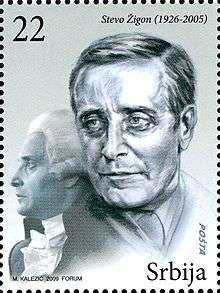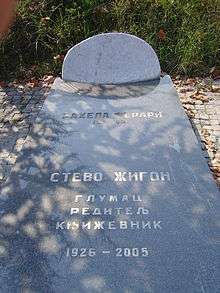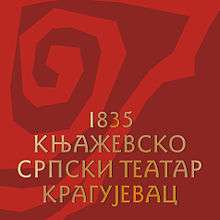Stevo Žigon
Štefan "Stevo" Žigon (Serbian Cyrillic: Стево Жигон; 8 December 1926 – 28 December 2005) was a Slovenian-Serbian actor, theatre director, and writer.
Stevo Žigon | |
|---|---|
Стево Жигон | |
 Stevo Žigon on a 2009 Serbian stamp | |
| Born | 8 December 1926 |
| Died | 28 December 2005 (aged 79) |
| Nationality | Slovenian, Serbian |
| Education | Faculty of Dramatic Arts |
| Alma mater | University of Arts in Belgrade |
| Occupation | Actor, theatre director, writer |
Biography

His origins were primarily Italian. He was born in Ljubljana, Slovenia, then part of the Kingdom of Serbs, Croats and Slovenes. His family were Slovene immigrants from the Slovenian Littoral, which was under Italian administration. His father was from the village of Volčji Grad near Komen in the Karst region, while his mother came from the Slovene community in Trieste (now in Italy). The family lived in Trieste until the Fascist takeover in 1922, when they fled to the neighboring Kingdom of Serbs, Croats and Slovenes.[1]
He studied acting in Ljubljana and Leningrad. He graduated in 1952, from the Academy for Theatre Arts in Belgrade. On faculty for acting in Belgrade he was one of the first assistants. Because of his knowledge of the German language and manners, he often played cynical and cold German officers. He was best known for playing "Krieger", chief of Belgrade Gestapo, in the popular 1970s TV series Otpisani and Povratak otpisanih.
During his youth, Žigon was an assiduous reader; he was fascinated by poetry, with his favorite poets being Alojz Gradnik, Igo Gruden, and Oton Župančič.[1]
In 1941, aged 14, as a member of Communist Youth League, he participated in many sabotage actions organized by the Liberation Front of the Slovenian People. In 1942, Žigon was captured by the Italian Army. As a minor, he was spared from execution and spent a year in an Italian military prison in the Province of Ljubljana.[1] After the Italian armistice in September 1943, he was captured by the Wehrmacht and sent to the Dachau (his prisoner number was 61185), where he learned German.
In 1968, at the time of the student demonstrations in Belgrade, Žigon emerged and performed Danton's Death; he played Robespierre for the students. The speech he made while his character was on trial caused the assembled students to explode into enthusiastic applause.[2]
He was married to Serbian actress Jelena Žigon. The couple's daughter Ivana is also an actress.
Filmography
| Year | Title | Role | Notes |
|---|---|---|---|
| 1950 | Cudotvorni mac | ||
| 1950 | Crveni cvet | ||
| 1957 | Vraticu se | Branko Medan ... pukovnik | |
| 1958 | Kala | Filozof | |
| 1959 | Pet minuta raja | Stevan | |
| 1960 | X-25 javlja | Hans Binder | |
| 1961 | L'enclos | Dragulavic | |
| 1964 | Sluzbeni polozaj | Urednik novina | |
| 1966 | Amandus | Joannes | |
| 1966 | Rondo | Mladen | |
| 1966 | Tople godine | ||
| 1967 | Memento | Vili Miler | |
| 1968 | Opatica i komesar | Doktor Simic | |
| 1968–1969 | Rinaldo Rinaldini | Cavalcanti | TV series |
| 1970 | Oxygen | Marko | |
| 1971 | Putovanje na mjesto nesrece | Nino, muz | |
| 1972 | Devojka sa Kosmaja | Major Beker | |
| 1972 | Walter Defends Sarajevo | Dr. Miskovic | |
| 1974 | Otpisani | Kriger | |
| 1974 | Parlog | ||
| 1974 | Strah | Blagot Balasica | |
| 1976 | Idealist | Priest from Zapolje | |
| 1976 | Povratak otpisanih | Kriger | |
| 1978 | Ward Six | Komandant grada | |
| 1978 | Occupation in 26 Pictures | Hubicka | |
| 1979 | Journalist | Tomac | |
| 1980 | Doslo doba da se ljubav proba | Direktor skole | |
| 1981 | Sesta brzina | Nacelnik | |
| 1982 | Nastojanje | Profesor Herak | |
| 1982 | Deseti brat | Mr. Piskav | |
| 1983 | Kako sam sistematski unisten od idiota | Stevo Zigon | |
| 1984 | The Secret Diary of Sigmund Freud | Professor Eberhardt | |
| 1985 | The Red and the Black | Upravitelj iz Trsta | |
| 1986 | Miss | Jork Morlok | |
| 1987 | The Harms Case | Profesor | |
| 1988 | P.S. - Post Scriptum | ||
| 1988 | Haloa - praznik kurvi | Profesor Manfred / Husband | |
| 1991 | Bracna putovanja | Grof Johan | |
| 1993 | Bolje od bekstva | Pozorisni reditelj | |
| 1993 | Kazi zasto me ostavi | Starac |
References
| Wikimedia Commons has media related to Stevo Žigon. |
- "Jaz sem boljševik, toda ne politični. Sem proti kapitalizmu, ker je v nasprotju z umetniško resnico. Zahodno krščanstvo je najhujša ideologija. Vatikan je prvi priznal Hrvaško, Vatikan je prek Slovenije in Janše pošiljal orožje v Bosno." – Stevo Žigon. Mladina.Si. Retrieved on 2014-07-24.
- Želimir Žilnik Lipanjska gibanja (documentary) on YouTube
